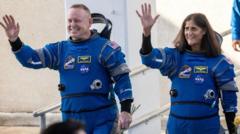When astronauts Suni Williams and Butch Wilmore set out on a test flight aboard the Boeing Starliner last year, they anticipated an eight-day mission. However, as they approached the International Space Station (ISS) with failing thrusters, the duo faced an unexpected crisis that could have left them stranded in space indefinitely. “Docking was imperative,” Wilmore emphasized in an interview, reflecting on their anxious moments when they questioned their ability to return home if they couldn't successfully dock at the ISS.
Fortunately, with assistance from Mission Control, they managed to restart their thrusters and dock safely at the ISS. Despite fears of never seeing Earth again, both astronauts handled the situation with resolute focus. “We didn't express our worst fears,” Williams recounted, stressing their training which prepared them to concentrate on problem-solving rather than panic.
Their saga began in June 2024 during the inaugural crewed test flight of the Starliner spacecraft, developed by Boeing. However, due to multiple technical issues, returning home on the Starliner was deemed too risky. Instead, they waited until a SpaceX capsule could safely bring them back. Boeing insisted the Starliner was safe, a claim validated when the capsule returned uncrewed a few months later.
After what was dubbed a “stranded” experience, the astronauts returned to Earth on March 18, having spent a remarkable nine months in space. Although they faced challenges, including insinuations of political abandonment, both Williams and Wilmore expressed their gratitude for the unwavering support of their teams back home. “We knew nobody was going to just let us down,” said Williams.
While in the ISS, the astronauts engaged in experiments to fill their time but also made fitness a priority. Wilmore, who exercised daily, believes this commitment helped him return to Earth stronger than ever. Both astronauts are now focusing on aiding NASA and Boeing in troubleshooting the malfunctioning spacecraft, expressing optimism about future flights. "It's a very capable spacecraft," Williams remarked, highlighting its unique advantages for future astronauts.
Fortunately, with assistance from Mission Control, they managed to restart their thrusters and dock safely at the ISS. Despite fears of never seeing Earth again, both astronauts handled the situation with resolute focus. “We didn't express our worst fears,” Williams recounted, stressing their training which prepared them to concentrate on problem-solving rather than panic.
Their saga began in June 2024 during the inaugural crewed test flight of the Starliner spacecraft, developed by Boeing. However, due to multiple technical issues, returning home on the Starliner was deemed too risky. Instead, they waited until a SpaceX capsule could safely bring them back. Boeing insisted the Starliner was safe, a claim validated when the capsule returned uncrewed a few months later.
After what was dubbed a “stranded” experience, the astronauts returned to Earth on March 18, having spent a remarkable nine months in space. Although they faced challenges, including insinuations of political abandonment, both Williams and Wilmore expressed their gratitude for the unwavering support of their teams back home. “We knew nobody was going to just let us down,” said Williams.
While in the ISS, the astronauts engaged in experiments to fill their time but also made fitness a priority. Wilmore, who exercised daily, believes this commitment helped him return to Earth stronger than ever. Both astronauts are now focusing on aiding NASA and Boeing in troubleshooting the malfunctioning spacecraft, expressing optimism about future flights. "It's a very capable spacecraft," Williams remarked, highlighting its unique advantages for future astronauts.



















